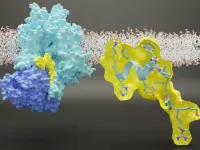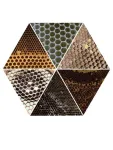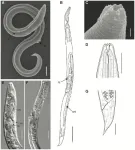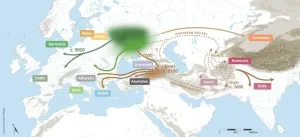(Press-News.org) Susan G. Komen®, the world’s leading breast cancer organization, announced the fourth MBC-focused research grant supported through the Komen Metastatic Breast Cancer Collaborative Research Initiative (MBCCRI), a collaboration between Komen, Duke Cancer Institute and the University of North Carolina Lineberger Comprehensive Cancer Center, which pairs researchers from each of the organizations to work together and address significant gaps in our knowledge about MBC to advance patient care and improve patient outcomes.
In 2021, Komen’s MBCCRI awarded $1.5 million for three research projects focused on finding new ways to prevent, detect, and treat metastatic and aggressive breast cancers and overcoming the inequities that lead certain people and communities to have higher rates of mortality from breast cancer.
“Currently there is no cure for MBC, however, through each innovative research project, we are one step closer to ending this disease,” said Paula Schneider, Komen’s president and CEO. “Our vision of a world without breast cancer would not be possible without investments like these that change our understanding of MBC and how it affects communities.”
Thanks to funds raised by individuals and organizations in North Carolina and across the country, this new grant will be awarded to a research team led by Katherine Reeder-Hayes, M.D., MBA, M.S. of the University of North Carolina Lineberger Comprehensive Cancer Center and Devon Check, Ph.D. of Duke Cancer Institute. The $499,998.70 grant will support their project to better understand the key social determinants of health and corresponding biological data related to inflammation, chronic stress, and immune system changes that impact MBC outcomes. This clinical trial and research study will help better understand racial disparities in breast cancer to improve outcomes for individuals with MBC.
For more information on Komen grants, please visit www.komen.org.
About MBCCRI
The Metastatic Breast Cancer (MBC) Collaborative Research Initiative is a first-of-its-kind collaborative effort that is bringing together the best and brightest researchers at Duke Cancer Institute and UNC Lineberger Comprehensive Cancer Center to find breakthrough discoveries to end MBC. This research will transform MBC from a terminal diagnosis to a chronic disease, giving patients and their families the priceless gift of time.
About Susan G. Komen®
Susan G. Komen® is the world’s leading nonprofit breast cancer organization, working to save lives and end breast cancer forever. Komen has an unmatched, comprehensive 360-degree approach to fighting this disease across all fronts and supporting millions of people in the U.S. and in countries worldwide. We advocate for patients, drive research breakthroughs, improve access to high-quality care, offer direct patient support and empower people with trustworthy information. Founded by Nancy G. Brinker, who promised her sister, Susan G. Komen, that she would end the disease that claimed Suzy’s life, Komen remains committed to supporting those affected by breast cancer today, while tirelessly searching for tomorrow’s cures. Visit komen.org or call 1-877 GO KOMEN. Connect with us on social at www.komen.org/contact-us/follow-us/.
END
Susan G. Komen® Awards new metastatic breast cancer research grant
The fourth metastatic breast cancer research grant funded by Komen’s Metastatic Breast Cancer Collaborative Research Initiative
2023-07-27
ELSE PRESS RELEASES FROM THIS DATE:
LJI and Kyowa Kirin launch immunology fellowship program
2023-07-27
LA JOLLA, CA—Support for early career researchers is about to get a major boost, thanks to a new fellowship fund established by leaders at La Jolla Institute for Immunology (LJI) and Japan-based global pharmaceutical corporation, Kyowa Kirin, Inc.
The fellowship fund has been named in honor of LJI Professor Michael Croft, Ph.D., who has worked closely with Kyowa Kirin scientists through the years. The new Michael Croft Fellowship in Immunology Fund recognizes Croft’s commitment to training and mentoring the next generation ...
Stephen K. Streiffer named director of Oak Ridge National Laboratory
2023-07-27
UT-Battelle, LLC, has appointed Stephen K. Streiffer to be the next director of Oak Ridge National Laboratory (ORNL). He currently serves as interim director at SLAC National Accelerator Laboratory and will join ORNL in October.
“Stephen is a proven leader with diverse experience and a commitment to mission-driven research and development,” said Lou Von Thaer, CEO of Battelle and chair of UT-Battelle, which operates ORNL for the U.S. Department of Energy (DOE). “Throughout his career, Stephen has leveraged existing strengths to create new opportunities and partnerships that strengthen our nation’s ability to innovate ...
Gene therapy treats chronic pain by dialing down sodium
2023-07-27
Researchers at NYU College of Dentistry’s Pain Research Center have developed a gene therapy that treats chronic pain by indirectly regulating a specific sodium ion channel, according to a new study published in the Proceedings of the National Academy of Sciences (PNAS).
The innovative therapy, tested in cells and animals, is made possible by the discovery of the precise region where a regulatory protein binds to the NaV1.7 sodium ion channel to control its activity.
“Our study represents a major step forward in understanding the underlying biology of the NaV1.7 sodium ion channel, which can be harnessed to provide relief from chronic pain,” said Rajesh ...
Bees and wasps independently invent the same architectural tricks
2023-07-27
At first glance, the hexagonal cells build by honey bees and social wasps may seem similar, but they are significantly different. Honey bees build using wax, whereas wasps use paper. Honey bees build their double-sided combs vertically, whereas wasps build single-sided comb horizontally (i.e., the opening of each cell faces downward).
Indeed, the hexagonal cells built by these two groups have independent evolutionary origins. Just like sharks and whales have similar body plans due to their watery environment, bees and wasps build hexagonal cells because the shape maximizes strength and storage area, while minimizing building materials.
But what happens when perfectly ...
Study finds strong support for easing Medicaid enrollment procedures
2023-07-27
During the COVID-19 pandemic, governments changed rules and procedures related to Medicaid enrollment. These changes decreased many of the burdens eligible people face when signing up for programs and contributed to a 30 percent increase in Medicaid enrollment. However, the end of public health emergency declarations brings an end to these pandemic policies, which many fear could lead to eligible people losing public health insurance simply because they are unable to fulfill administrative requirements such as accurately filling out and submitting forms, renewing their enrollment ...
MIND diet study shows 'short-term' impact on cognition
2023-07-27
New research shows the importance of long-term commitment to the MIND diet for reaping the greatest benefit to brain health.
“The benefits within the new study’s three-year clinical trial weren’t as impressive as we’ve seen with the MIND diet observational studies in the past, but there were improvements in cognition in the short-term, consistent with the longer-term observational data,” said lead study author Lisa Barnes, PhD, associate director of the Alzheimer’s Disease Research Center at RUSH.
Results from the study, published in The New England Journal of Medicine, showed that within a three-year period, there was no significant ...
Race/ethnicity isn't associated with unplanned hospitalizations after breast reconstruction
2023-07-27
July 27, 2023 – Race/ethnicity is not an independent predictor of hospital readmission in patients undergoing breast reconstruction surgery, reports a study in the August issue of Plastic and Reconstructive Surgery®, the official medical journal of the American Society of Plastic Surgeons (ASPS). The journal is published in the Lippincott portfolio by Wolters Kluwer.
Among patients who have unplanned hospitalizations after breast reconstruction, costs are substantially higher for Black or Hispanic patients, according to the new research by ASPS ...
Nematode resurrected from Siberian permafrost laid dormant for 46,000 years
2023-07-27
A soil nematode reanimated from Siberian permafrost had laid dormant for approximately 46,000 years, according to a study publishing July 27, 2023 in the open access journal PLOS Genetics by Anastasia Shatilovich at the Institute of Physicochemical and Biological Problems in Soil Science RAS in Russia, Vamshidhar Gade at the Max Planck Institute for Molecular Cell Biology and Genetics in Germany, and colleagues.
Some animals, such as tardigrades, rotifers, and nematodes, can survive harsh conditions by entering a dormant state known as “cryptobiosis”. Previously, nematode individuals were reanimated from samples collected from a fossilized burrow in silt deposits ...
New insights into the origin of the Indo-European languages
2023-07-27
For over two hundred years, the origin of the Indo-European languages has been disputed. Two main theories have recently dominated this debate: the ‘Steppe’ hypothesis, which proposes an origin in the Pontic-Caspian Steppe around 6000 years ago, and the ‘Anatolian’ or ‘farming’ hypothesis, suggesting an older origin tied to early agriculture around 9000 years ago. Previous phylogenetic analyses of Indo-European languages have come to conflicting conclusions about the age of the family, due to the combined effects of inaccuracies and inconsistencies in the datasets they used and limitations in the way that phylogenetic methods analyzed ...
Genome analysis of 46,000-year-old roundworm from Siberian permafrost reveals novel species
2023-07-27
Some organisms, such as tardigrades, rotifers, and nematodes, can survive harsh conditions by entering a dormant state known as “cryptobiosis.” In 2018, researchers from the Institute of Physicochemical and Biological Problems in Soil Science RAS in Russia found two roundworms (nematode) species in the Siberian Permafrost. Radiocarbon dating indicated that the nematode individuals have remained in cryptobiosis since the late Pleistocene, about 46,000 years ago. Researchers from the Max Planck Institute of Molecular Cell Biology and Genetics (MPI-CBG) in ...
LAST 30 PRESS RELEASES:
Doctors and nurses believe their own substance use affects patients
Life forms can planet hop on asteroid debris – and survive
Sylvia Hurtado voted AERA President-Elect; key members elected to AERA Council
Mount Sinai and King Saud University Medical City forge a three-year collaboration to advance precision medicine in familial inflammatory bowel disease
AI biases can influence people’s perception of history
Prenatal opioid exposure and well-being through adolescence
Big and small dogs both impact indoor air quality, just differently
Wearing a weighted vest to strengthen bones? Make sure you’re moving
Microbe survives the pressures of impact-induced ejection from Mars
Asteroid samples offer new insights into conditions when the solar system formed
Fecal transplants from older mice significantly improve ovarian function and fertility in younger mice
Delight for diastereomer production: A novel strategy for organic chemistry
Permafrost is key to carbon storage. That makes northern wildfires even more dangerous
Hairdressers could be a secret weapon in tackling climate change, new research finds
Genetic risk for mental illness is far less disorder-specific than clinicians have assumed, massive Swedish study reveals
A therapeutic target that would curb the spread of coronaviruses has been identified
Modern twist on wildfire management methods found also to have a bonus feature that protects water supplies
AI enables defect-aware prediction of metal 3D-printed part quality
Miniscule fossil discovery reveals fresh clues into the evolution of the earliest-known relative of all primates
World Water Day 2026: Applied Microbiology International to hold Gender Equality and Water webinar
The unprecedented transformation in energy: The Third Energy Revolution toward carbon neutrality
Building on the far side: AI analysis suggests sturdier foundation for future lunar bases
Far-field superresolution imaging via k-space superoscillation
10 Years, 70% shift: Wastewater upgrades quietly transform river microbiomes
Why does chronic back pain make everyday sounds feel harsher? Brain imaging study points to a treatable cause
Video messaging effectiveness depends on quality of streaming experience, research shows
Introducing the “bloom” cycle, or why plants are not stupid
The Lancet Oncology: Breast cancer remains the most common cancer among women worldwide, with annual cases expected to reach over 3.5 million by 2050
Improve education and transitional support for autistic people to prevent death by suicide, say experts
GLP-1 drugs like Ozempic could cut risk of major heart complications after heart attack, study finds
[Press-News.org] Susan G. Komen® Awards new metastatic breast cancer research grantThe fourth metastatic breast cancer research grant funded by Komen’s Metastatic Breast Cancer Collaborative Research Initiative






